Part Two: The Second Generation, From Lawrence Brown to Lena McLin
These composers, born from the last decade of the 19th Century to the 1920s, were witnesses to or impacted by the effects of Jim Crow Laws, the Great War, the Harlem Renaissance, and World War II. Their compositional treatments of the Negro Spiritual not only reflected Neo-Romanticism, but the influences of popular music, such as Jazz and Blues, of the era.
Lawrence Brown
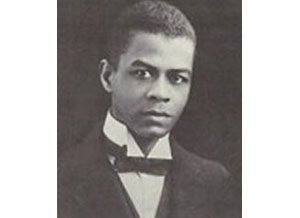 Lawrence Benjamin Brown (b. 28 August, 1893; d. 25 December, 1972, New York, New York) began studying piano as a youth and quickly demonstrated a gift for playing the instrument. He continued his studies first in Boston, then to London, where he attended Trinity College and developed skills as both a pianist and composer. He became accompanist for tenor Roland Hayes, joining him for a command performance for the king of England in 1921. Brown returned to the United State in 1925 in order to further develop his knowledge of Negro Spirituals, which led to composing several concert settings for solo voice and piano. Baritone Paul Robeson introduced Brown’s songs in what is believed to be the first all-Spirituals recital in 1925. Brown toured internationally and recorded with Robeson in a collaboration that lasted until 1968.
Lawrence Benjamin Brown (b. 28 August, 1893; d. 25 December, 1972, New York, New York) began studying piano as a youth and quickly demonstrated a gift for playing the instrument. He continued his studies first in Boston, then to London, where he attended Trinity College and developed skills as both a pianist and composer. He became accompanist for tenor Roland Hayes, joining him for a command performance for the king of England in 1921. Brown returned to the United State in 1925 in order to further develop his knowledge of Negro Spirituals, which led to composing several concert settings for solo voice and piano. Baritone Paul Robeson introduced Brown’s songs in what is believed to be the first all-Spirituals recital in 1925. Brown toured internationally and recorded with Robeson in a collaboration that lasted until 1968.
Several of Brown’s Spirituals were published in The Books of American Negro Spirituals. “Dere’s a Man Goin’ Roun’ Takin’ Names” was published in 1930 in a five-song collection for voice and piano by Schott.
“Dere’s a Man Goin’ Roun’ Takin’ Names”
Lawrence Brown, composer
Paul Robeson, bass-baritone
The EMI Sessions 1928-1939
Song available in: Negro Folk Songs
Eva Jessye
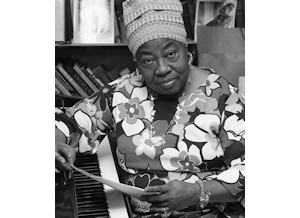 Eva Alberta Jessye (b. 20 January 1895, Coffeyville, Kansas; d. 21 February 1992, Ann Arbor, Michigan) Born to ex-slaves, Jessye was best known as founder and director of the Eva Jessye Choir, which gained international recognition for its work on radio, in films and on Broadway, including performing in Virgil Thomson’s opera, Four Saints in Three Acts. She was music director for the original cast of George Gershwin’s Porgy and Bess. An educator, singer, poet and actress, Jessye also composed works for chorus and solo voice.
Eva Alberta Jessye (b. 20 January 1895, Coffeyville, Kansas; d. 21 February 1992, Ann Arbor, Michigan) Born to ex-slaves, Jessye was best known as founder and director of the Eva Jessye Choir, which gained international recognition for its work on radio, in films and on Broadway, including performing in Virgil Thomson’s opera, Four Saints in Three Acts. She was music director for the original cast of George Gershwin’s Porgy and Bess. An educator, singer, poet and actress, Jessye also composed works for chorus and solo voice.
Jessye published My Spirituals for solo voice in 1927. She prefaced each of the 16 songs in the collection with stories and poems about family and community members who sang those folk songs in worship or during everyday or special life events.
“Bles’ My Soul an’ Gone”
Eva Jessye, composer
Marti Newland, soprano
Song available in: My Spirituals
William Grant Still
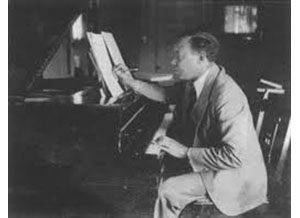 William Grant Still (b. 11 May 1895, Woodville, Mississippi; d. 3 December 1978, Los Angeles, California), known as the “Dean of Black Music,” studied at Wilberforce University and Oberlin College and received a Guggenheim Fellowship. His Afro-American Symphony was the first by an African American composer to be performed by a major orchestra. While he wrote for the operatic stage and for television, as well as vocal and instrumental works for the concert stage, he set few spirituals as art songs. He preferred, instead, to use blues elements for his inspiration. However, his setting of “Here’s One” has been recorded by several vocalists.
William Grant Still (b. 11 May 1895, Woodville, Mississippi; d. 3 December 1978, Los Angeles, California), known as the “Dean of Black Music,” studied at Wilberforce University and Oberlin College and received a Guggenheim Fellowship. His Afro-American Symphony was the first by an African American composer to be performed by a major orchestra. While he wrote for the operatic stage and for television, as well as vocal and instrumental works for the concert stage, he set few spirituals as art songs. He preferred, instead, to use blues elements for his inspiration. However, his setting of “Here’s One” has been recorded by several vocalists.
“Here’s One”
William Grant Still, composer
Florence Quivar, mezzo-soprano
Spirituals
Song available as: sheet music
William Lawrence
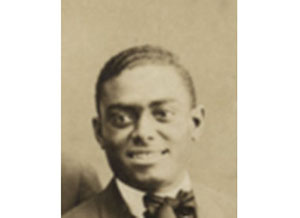 William Lawrence (b. Charleston, South Carolina, 20 September, 1895; d. 17 March 1981, New York, New York) The son of a church organist, Lawrence started piano lessons as a child. He studied piano, voice and harmony variously at Avery Normal Institute, Charleston, the New England Conservatory, Boston, Boston University, as well as in Paris. He toured extensively, both as accompanist for tenor Roland Hayes and as part of the Hayes Trio. He accepted a teaching position at what is now South Carolina State in Orangeburg. He moved to New York, where he conducted a music studio and worked actively as an accompanist.
William Lawrence (b. Charleston, South Carolina, 20 September, 1895; d. 17 March 1981, New York, New York) The son of a church organist, Lawrence started piano lessons as a child. He studied piano, voice and harmony variously at Avery Normal Institute, Charleston, the New England Conservatory, Boston, Boston University, as well as in Paris. He toured extensively, both as accompanist for tenor Roland Hayes and as part of the Hayes Trio. He accepted a teaching position at what is now South Carolina State in Orangeburg. He moved to New York, where he conducted a music studio and worked actively as an accompanist.
Lawrence used one of the few instances of Communion-themed Negro Spirituals for his setting of “Let Us Break Bread Together on Our Knees.” The song was published in 1945 and was a favorite of contralto Marian Anderson.
“Let Us Break Bread Together on Our Knees”
William Lawrence, composer
Marian Anderson, contralto
Spirituals
Song available as: sheet music
Robert MacGimsey
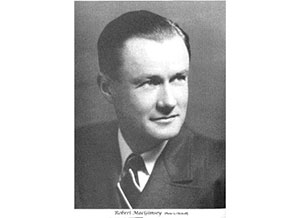
Robert Hunter MacGimsey (b. Pineville, Louisiana, 7 September, 1898; d. 13 March 1979, Phoenix, Arizona) received his musical training at Juilliard. After a brief career as a lawyer, he became a professional whistler, performing on the radio and in recordings. He also pursued a career as a singer and composer. His songs reflected his southern roots, especially the Negro folk songs he heard throughout his lifetime.
His “Sweet Little Jesus Boy” was an original song styled on Negro Spirituals and was published in 1934. In a compilation of MacGimsey’s transcriptions, it was stated that, “When Robert transcribed an authentic spiritual, or composed a song which he had written in this context, the dialect was the primary rendition with the ‘white man’s’ vocabulary written below it; this was intended only as an interpretation of the Negro dialect and not as an alternative lyrics for the song.” The song has been performed and recorded extensively over the years.
“Sweet Little Jesus Boy”
Robert MacGimsey, composer
Carol Brice, contralto
The Christmas Album
Song available in: (Medium voice) (Low voice)
Edward Boatner
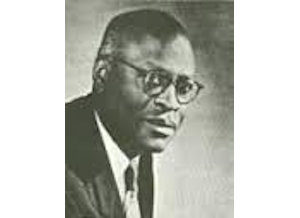 Edward Hammond Boatner (b. 13 November 1898, New Orleans, Louisiana; d. New York, New York, 16 June 1981) Boatner was exposed to Negro folksongs while traveling from church to church with his father, a preacher. He studied at Western University, Quindaro, Kansas, the Boston Conservatory, and the Chicago Musical College, where he earned his bachelor of music. R. Nathaniel Dett gave him coaching and went with him on a joint tour of New England. He taught at Samuel Huston College and Wiley College in Texas, and he served as director of music for the National Baptist Convention. Boatner moved to New York where, in addition to becoming a successful singer and educator, he started composing. His works included over 200 Spirituals for solo voice and piano. Several of his works were premiered by such singers as H. T. Burleigh, Roland Hayes, and Marian Anderson.
Edward Hammond Boatner (b. 13 November 1898, New Orleans, Louisiana; d. New York, New York, 16 June 1981) Boatner was exposed to Negro folksongs while traveling from church to church with his father, a preacher. He studied at Western University, Quindaro, Kansas, the Boston Conservatory, and the Chicago Musical College, where he earned his bachelor of music. R. Nathaniel Dett gave him coaching and went with him on a joint tour of New England. He taught at Samuel Huston College and Wiley College in Texas, and he served as director of music for the National Baptist Convention. Boatner moved to New York where, in addition to becoming a successful singer and educator, he started composing. His works included over 200 Spirituals for solo voice and piano. Several of his works were premiered by such singers as H. T. Burleigh, Roland Hayes, and Marian Anderson.
“City Called Heaven”
Edward Boatner, composer
Mattiwilda Dobbs, soprano
Tva Sidor Av Mattiwilda Dobbs Och Gotthard Arner
Song available in: The Story of the Spirituals
Hamilton Forrest
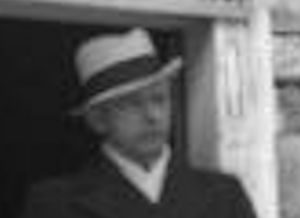 Hamilton Forrest (b. 8 January 1901, Chicago, Illinois; d. 26 December 1963, London, England) completed his bachelor’s and master’s musical studies at the American Conservatory of Music, Chicago. During his extensive travels, he researched and collected folk music in Kentucky before establishing himself in England.
Hamilton Forrest (b. 8 January 1901, Chicago, Illinois; d. 26 December 1963, London, England) completed his bachelor’s and master’s musical studies at the American Conservatory of Music, Chicago. During his extensive travels, he researched and collected folk music in Kentucky before establishing himself in England.
Forrest’s setting of “He’s Got the Whole World in His Hand” was published in 1951. He dedicated the Spiritual to contralto Marian Anderson, who regularly programmed the song in her recitals. Anderson was noted as stating that Forrest “provided a piano part that fits the words like a glove.”
“He’s Got the Whole World in His Hand”
Hamilton Forrest, composer
Martina Arroyo, soprano
Spirituals
Song available in: sheet music
John Wesley Work III
 John Wesley Work III (b. 15 July 1901, Tullahoma, Tennessee; d. 17 May 1967, Nashville, Tennessee) was born into a musical family, where his mother was a trained singer, his father was a music professor at Fisk, and his paternal grandfather was a church choral director who had worked with some of the original members of the Fisk Jubilee Singers. Unsurprisingly, his musical studies started at an early age, leading to undergraduate study at Fisk, additional study at the Institute of Musical Art (later renamed Julliard), a master’s degree from Columbia, a second bachelor’s from Yale, and an honorary doctorate from Fisk. In addition to his music teaching and administrative duties at Fisk, he extensively wrote scholarly articles and participated in a major field study of Mississippi Delta folk songs for the Library of Congress. As a composer, Work wrote for a variety of solo and ensemble forces, but he focused on choral and solo vocal music.
John Wesley Work III (b. 15 July 1901, Tullahoma, Tennessee; d. 17 May 1967, Nashville, Tennessee) was born into a musical family, where his mother was a trained singer, his father was a music professor at Fisk, and his paternal grandfather was a church choral director who had worked with some of the original members of the Fisk Jubilee Singers. Unsurprisingly, his musical studies started at an early age, leading to undergraduate study at Fisk, additional study at the Institute of Musical Art (later renamed Julliard), a master’s degree from Columbia, a second bachelor’s from Yale, and an honorary doctorate from Fisk. In addition to his music teaching and administrative duties at Fisk, he extensively wrote scholarly articles and participated in a major field study of Mississippi Delta folk songs for the Library of Congress. As a composer, Work wrote for a variety of solo and ensemble forces, but he focused on choral and solo vocal music.
“This Little Light o’ Mine”
John Wesley Work III, composer
Kevin Maynor, bass
Songs of America from Another American
Song available as: sheet music
Undine Smith Moore
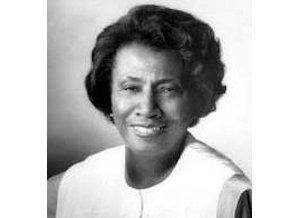 Undine Smith Moore (b. Jarrett, Virginia, 25 August 1904; d. Petersburg, Virginia, 6 February 1989) Smith Moore, the granddaughter of former slaves, began studying piano as a child. She completed her undergraduate studies at Fisk and received her master’s degree from Columbia University Teachers College, with additional study at Julliard, Manhattan School of Music and Eastman. She taught first in the Goldsboro, North Carolina, public school system and a 45-year tenure at Virginia State College. She shared her interest in the music of Black America through workshops and lectures across the United States. While Smith Moore primarily composed choral works, including the Pulitzer Prize-nominated Scenes from the Life of a Martyr, she also wrote a number of chamber and orchestral works, as well as solo works for voice and for various solo instruments.
Undine Smith Moore (b. Jarrett, Virginia, 25 August 1904; d. Petersburg, Virginia, 6 February 1989) Smith Moore, the granddaughter of former slaves, began studying piano as a child. She completed her undergraduate studies at Fisk and received her master’s degree from Columbia University Teachers College, with additional study at Julliard, Manhattan School of Music and Eastman. She taught first in the Goldsboro, North Carolina, public school system and a 45-year tenure at Virginia State College. She shared her interest in the music of Black America through workshops and lectures across the United States. While Smith Moore primarily composed choral works, including the Pulitzer Prize-nominated Scenes from the Life of a Martyr, she also wrote a number of chamber and orchestral works, as well as solo works for voice and for various solo instruments.
“Is There Anybody Here Who Loves My Jesus”
Undine Smith Moore, composer
Pamela Dillard, mezzo-soprano
Watch and Pray
Song available in: Art Songs and Spirituals by African-American Women Composers
Margaret Bonds
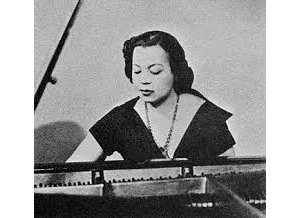 Margaret Bonds (b. 3 March 1913, Chicago, Illinois; d. 26 April 1972, Los Angeles, California) received her bachelor’s and master’s degrees in music from Northwestern University, with additional study at the Juilliard School. The pianist was the first African American to perform with the Chicago Symphony Orchestra. An educator and composer, Bonds wrote works for the theater, ballet, orchestra, and piano, but the majority were art and popular songs.
Margaret Bonds (b. 3 March 1913, Chicago, Illinois; d. 26 April 1972, Los Angeles, California) received her bachelor’s and master’s degrees in music from Northwestern University, with additional study at the Juilliard School. The pianist was the first African American to perform with the Chicago Symphony Orchestra. An educator and composer, Bonds wrote works for the theater, ballet, orchestra, and piano, but the majority were art and popular songs.
Bonds’ best known Spiritual is her setting of “He’s Got the Whole World in His Hand”, commissioned by Leontyne Price in 1963.
“He’s Got the Whole World in His Hand”
Margaret Bonds, composer
Leontyne Price, soprano
Leontyne Price reDiscovered
Song available in: In His Hand: Seven Spirituals Arranged by Margaret Bonds
Thomas Kerr, Jr.
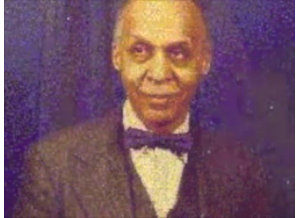 Thomas Henderson Kerr, Jr. (b. Baltimore, Maryland, 3 January 1915; d. Washington, DC, 26 August 1988) Kerr attended the Eastman School of Music of the University of Rochester, New York, where he received the Bachelor of Music degree. He joined the faculty at Howard University, Washington, DC, in 1943 and served for 35 years as a piano and composition instructor and organist. He also toured
Thomas Henderson Kerr, Jr. (b. Baltimore, Maryland, 3 January 1915; d. Washington, DC, 26 August 1988) Kerr attended the Eastman School of Music of the University of Rochester, New York, where he received the Bachelor of Music degree. He joined the faculty at Howard University, Washington, DC, in 1943 and served for 35 years as a piano and composition instructor and organist. He also toured
extensively as a concert pianist. Kerr composed primarily for the organ; however, he also wrote piano, choral, and solo vocal works, including the Negro Spiritual, “Great Day.”
Great Day
Thomas Kerr, Jr., composer
Jessye Norman, soprano
Spirituals
Song available in: New Negro Spiritual, compiled by Willis Patterson
Julia Perry
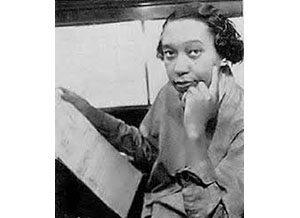 Julia Amanda Perry (Born, 25 March 1924, Lexington, Kentucky; died, Akron, Ohio, 24 April 1979). Born into a musical family, Perry moved to Akron, where she studied music in the public school and then at Akron University, Westminister Choir College. She continued her studies at Julliard, Berkshire Music Center, and composition and orchestral conducting in Europe. Perry taught at Florida Agricultural and Mechanical University and at Atlanta University. Perry twice earned the Guggenheim Fellowship; she was also recipient of a Boulanger Grand Prix and an award from the National Institute of Arts and Letters.
Julia Amanda Perry (Born, 25 March 1924, Lexington, Kentucky; died, Akron, Ohio, 24 April 1979). Born into a musical family, Perry moved to Akron, where she studied music in the public school and then at Akron University, Westminister Choir College. She continued her studies at Julliard, Berkshire Music Center, and composition and orchestral conducting in Europe. Perry taught at Florida Agricultural and Mechanical University and at Atlanta University. Perry twice earned the Guggenheim Fellowship; she was also recipient of a Boulanger Grand Prix and an award from the National Institute of Arts and Letters.
She gained international acclaim for her Stabat Mater for contralto and string orchestra. Her compositions included over 50 works for a variety of solo instruments and large and small ensembles, as well as solo vocal and choral works.
“I’m a poor little orphan in this world!”
Julia Perry, composer
Shirley Verrett, mezzo-soprano
Gospels & Spirituals Gold Collection
Song available in: Art Songs and Spirituals by African-American Women Composers
Hale Smith
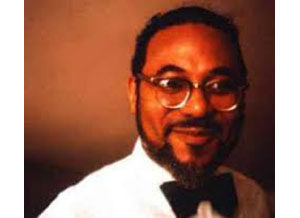 Hale Smith (b. Cleveland, Ohio, 29 June 1925; d. 24 November 2009, Freeport, Long Island, New York) Smith received his bachelor’s and master’s degrees in music from the Cleveland Institute of Music. After moving to New York in 1958, professional career included serving as an editor and music choral consultant for various music publishing houses and teaching at Long Island University and the University of Connecticut, Storrs. He has composed numerous orchestral and chamber works, as well as several choral and solo vocal pieces.
Hale Smith (b. Cleveland, Ohio, 29 June 1925; d. 24 November 2009, Freeport, Long Island, New York) Smith received his bachelor’s and master’s degrees in music from the Cleveland Institute of Music. After moving to New York in 1958, professional career included serving as an editor and music choral consultant for various music publishing houses and teaching at Long Island University and the University of Connecticut, Storrs. He has composed numerous orchestral and chamber works, as well as several choral and solo vocal pieces.
Smith classified his writing style as working “with a few, key motivic ideas.” He used both European techniques and Black jazz and folk music influences in his writing. His setting of “This Little Light of Mine” was composed in 1986 and published by his Halsco publishing company.
“I Want to Die Easy”
Hale Smith, composer
Donnie Ray Albert, baritone
Donnie Ray Albert in Recital
Song available in: New Negro Spiritual, compiled by Willis Patterson
Robert Owens
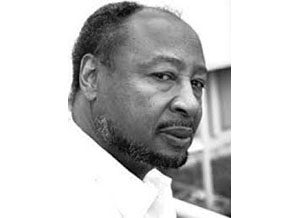 Robert Lee Owens (b. 4 February 1925, Dennison, Texas; d. 5 January, 2017, Munich, Germany) began his musical training at an early age, first in piano and, by high school, music theory and composition. As a pianist, educator and composer, he became acquainted with poet Langston Hughes, who became one of several 19th- and 20th-century poets whose texts Owens used in his compositions. He emigrated to Germany, where he sought professional musical opportunities he believed he would not find in the United States. Over his career, Owens used his exposure to Western European and American stylistic practices to create his own distinctive compositional approach.
Robert Lee Owens (b. 4 February 1925, Dennison, Texas; d. 5 January, 2017, Munich, Germany) began his musical training at an early age, first in piano and, by high school, music theory and composition. As a pianist, educator and composer, he became acquainted with poet Langston Hughes, who became one of several 19th- and 20th-century poets whose texts Owens used in his compositions. He emigrated to Germany, where he sought professional musical opportunities he believed he would not find in the United States. Over his career, Owens used his exposure to Western European and American stylistic practices to create his own distinctive compositional approach.
“Po’ Mourner’s Got a Home at Las'” was the third of six Spirituals Owens selected for bass (baritone) and piano. The cycle, Six Negro Spirituals for Bass (Baritone) and Piano, was published in 2005.
“Po’ Mourner’s Got a Home at Las'”
Robert Owens, composer
Oral Moses, bass-baritone
Amen! African-American Composers of the 20th Century
Song available in: Six Negro Spirituals for Bass (Baritone) and Piano
Betty Jackson King
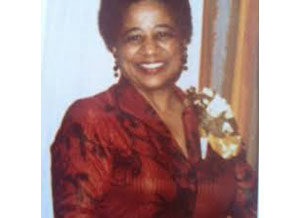 Betty Lou Jackson King (b. 17 February 1928, Chicago, Illinois; d. Wildwood, New Jersey, 1 June 1994). After completing her education in music composition, she developed a career as an educator, church musician, lecturer, choral director, composer, and music publisher.
Betty Lou Jackson King (b. 17 February 1928, Chicago, Illinois; d. Wildwood, New Jersey, 1 June 1994). After completing her education in music composition, she developed a career as an educator, church musician, lecturer, choral director, composer, and music publisher.
Jackson King, along with composers Roland Carter and Wendell Whalum, each contributed two spiritual settings to God Is a God. Carter stated that there is no clear order to the placement of the pieces, leaving their organization to the performer’s discretion.
“Calvary” was dedicated to baritone William Warfield and is described as depicting, “… the horrors of the crucifixion with dissonant harmonies in the piano accompaniment as the introduction that returns with each voice. In the bass you hear the hammering and the death knell that becomes more insistent with each verse. This is best suited for a low voice and requires dramatic intensity.”
“Calvary”
Betty Jackson King, composer
Robert Honeysucker, baritone
Watch and Pray: Spirituals and Art Songs by African-American Women Composers
Song available as: sheet music download
Lena McLin
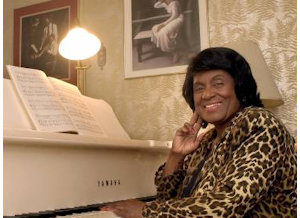 Lena Mae (née Johnson) McLin (b. 5 September 1929, Atlanta, Georgia) was raised in the home of her uncle, Gospel music great Thomas A. Dorsey, whose choir she accompanied. After receiving her bachelor’s degree in music from Spelman College and master’s from the American Conservatory of Music, McLin taught music in the Chicago public school system. She instructed several students who went on to professional careers in Classical and popular music. A choral director, lecturer, author and ordained minister, McLin is also credited as a composer of over 400 choral and solo vocal works, as well as instrumental and electronic compositions.
Lena Mae (née Johnson) McLin (b. 5 September 1929, Atlanta, Georgia) was raised in the home of her uncle, Gospel music great Thomas A. Dorsey, whose choir she accompanied. After receiving her bachelor’s degree in music from Spelman College and master’s from the American Conservatory of Music, McLin taught music in the Chicago public school system. She instructed several students who went on to professional careers in Classical and popular music. A choral director, lecturer, author and ordained minister, McLin is also credited as a composer of over 400 choral and solo vocal works, as well as instrumental and electronic compositions.
“Glory, Glory, Hallelujah”
Lena McLin, composer
Mark Rucker, baritone
Mark Rucker sings Lena McLin
Song available in: Songs for Voice And Piano
| A downloadable presentation version of this document is now available at: https://www.slideshare.net/jonesran/a-century-of-negro-spirituals-for-solo-voice-102767001 |
The Pioneers | The Second Generation | The Now Generation | Discography & Scores Bibliography